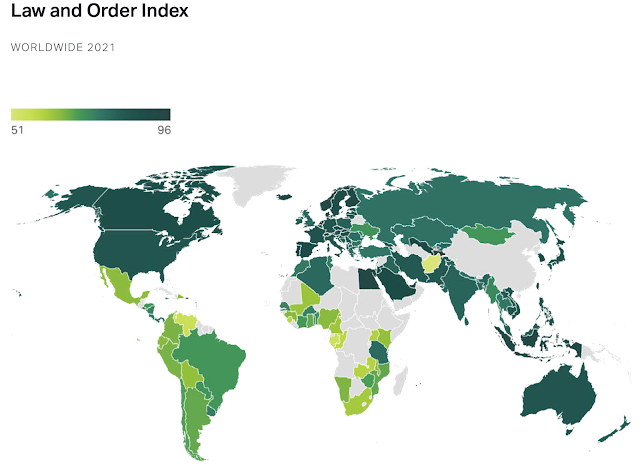Gallup Law and Order Survey 2021 shows that Pakistan (score 82) is safer than Bangladesh (79) and India (80) and Sri Lanka (80). Gallup’s survey is based on responses to four questions to measure “people’s sense of personal security and their personal experiences with crime and law enforcement”. The questions are as follows: 1) In the city or area where you live, do you have confidence in the local police force?; 2) Do you feel safe walking alone at night in the city or area where you live?; 3) Within the last 12 months, have you had money or property stolen from you or another household member?; 4) Within the past 12 months, have you been assaulted or mugged? Gallup interviewed 127,000 people in 120 countries to compile the report.
 |
| Gallup Law and Order Survey Results 2022. Source: Gallup |
The survey, conducted by global analytics firm Gallup, ranks Singapore, Tajikistan, Norway, Switzerland and Indonesia as the safest countries in the world. It ranks Sierra Leone, DR Congo, Venezuela, Gabon and Afghanistan as the least secure countries.
Safety and quality of life global surveys at the city level regularly done by Numbeo support the findings of Gallup Law and Order Survey. Numbeo surveys are based on responses received from its website visitors. Numbeo filters "surveys to eliminate potential spam, like people entering a large amount of data which are differentiating from the median value". Numbeo's Quality of Life Index captures purchasing power, cost of living, housing, health care, safety, traffic congestion and environmental pollution. The Pakistani capital of Islamabad ranks higher than New Delhi, Mumbai, London and New York in terms of safety and quality of life.
 |
| Safety Score of Selected Cities. Source: Numbeo |
In terms of safety in South Asia region, Islamabad (50) ranks the highest followed by Lahore (103), Colombo (110), Chennai (112), Hyderabad (130), Mumbai (140), Karachi (188), Bangalore (200), New Delhi (216) and Dhaka (232).
 |
| Quality of Life Scores and Rankings of Selected Cities. Source: Numbeo |
On quality of life in South Asia, Islamabad ranks 144 followed by Bangalore 167, Hyderabad 195, Chennai 218, Lahore 219, Karachi 237, New Delhi 239, Mumbai 246, Colombo 251 and Dhaka 252.
In 2019, India was ranked as the fifth most dangerous country in the world for expats, according to media reports. In a survey — Expat Insider 2019 — that covered and interviewed people who live and work abroad, India has been placed at 60 of 64 countries on safety and security. According to the survey which was conducted by InterNations, over four men in ten respondents reported negative feelings about the peacefulness in the country and 27% were displeased with their personal safety — three times the global average of 9%. “A US American expat, for example, does not like “always having to keep my guard up — as a female, I don’t feel safe. As a resident, I often feel taken advantage of at work and outside work,” the survey said. The expats also rated negatively to the question of political stability in India. “Almost double the global average (32% vs 17% worldwide) rate the political stability of the country negatively. An Australian expat shares that ‘politics has become hardline, and there are social tensions’,” the survey found.
Related Links:
Haq's Musings
South Asia Investor Review
Pakistan Among World's Largest Food Producers
India is Home 75% of World's Population Deprived of Basic Living Standards
Food in Pakistan 2nd Cheapest in the World
India in Crisis: Unemployment and Hunger Persist After COVID
Impact of Russia Sanctions on Food, Fuel Availability
Record Number of Indians Seeking Asylum in US
Pakistan Happiness Index Ranking
Incomes of Poorest Pakistanis Growing Faster Than Their Richest Counterparts
Pakistanis Consuming More Calories, Fruits & Vegetables Per Capita
How Grim is Pakistan's Social Sector Progress?
Pakistan Fares Marginally Better Than India On Disease Burdens
COVID Lockdown Decimates India's Middle Class
Pakistan Child Health Indicators
Pakistan's Balance of Payments Crisis
How Has India Built Large Forex Reserves Despite Perennial Trade Deficits
Riaz Haq's Youtube Channel
